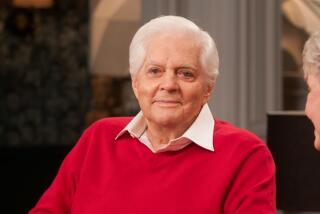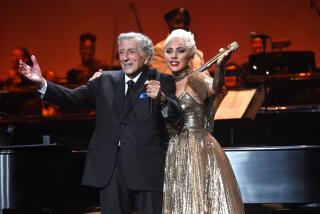Donald Voorhees; Director of ‘Bell Telephone Hour’
- Share via
Donald Voorhees, the silver-haired, celebrated conductor and musical director of the “Bell Telephone Hour” during its entire 28 years on radio and television has died of pneumonia at age 85.
The New York Times reported that Voorhees, whose affiliation with radio dated to the infancy of the CBS network in the mid-1920s, died Tuesday at a hospital in Cape May Court House, N.J., near his home in Stone Harbor.
Loyal Following
From 1940 to 1959 each Monday night on radio and from 1960 to 1968 on Sunday, Tuesday and most often Friday nights on television, the 57-piece orchestra--which Voorhees often directed with a pencil rather than a baton--offered a classical alternative to the popular music and comedy that dominated the early days of broadcasting.
On radio the show had been part of “NBC’s Monday Night of Music,” an hours-long block of programming that also featured “The Railroad Hour,” “The Voice of Firestone” and the NBC Symphony orchestra. The classically oriented programs attracted a surprisingly large and loyal following until the advent of television.
In October, 1959, Voorhees, who composed the program’s lilting theme “The Bell Waltz,” moved the orchestra into TV where it became a showcase for leading artists of the day. They ranged from Benny Goodman to Mahalia Jackson to Bing Crosby to the Kingston Trio to Rudolf Nureyev, who made his TV debut on the show in 1961. Where Jascha Heifetz, Ezio Pinza, Nelson Eddy and Marian Anderson had appeared on the radio version of the show, now Joan Sutherland, Van Cliburn, Pablo Casals and Arturo Toscanini were seen during the series’ TV years.
Later, as audience enthusiasm waned, the show ran as a biweekly or monthly series before finally going off the air in 1968.
Voorhees, a musical prodigy, had first conducted at age 11 at a church in his native Allentown, Pa. He was believed to be the youngest orchestra leader on Broadway when, at 17, he was in the pit for Eddie Cantor’s “Broadway Brevities of 1920.”
Over the next decade he conducted nearly a dozen more successful musical comedies while also working in early radio. His first known radio credit was “The Atwater Kent Hour” in the mid-1920s and he later led orchestras for “The Fire Chief” with Ed Wynn, “The March of Time,” “Mr. and Mrs. North,” “Show Boat” and the very early satire “Stoopnagle and Budd.” He also composed the music for “Du Pont’s Cavalcade of America.”
Of all the artists with whom he shared the spotlight, he said in 1965 that Heifetz was his favorite.
“He always did something new and different. He believed it was his place as a leader in his field to perform the new and the unusual.”
Voorhees, an accomplished violinist, pianist and organist, became a guest conductor with various symphonies throughout the country after the Bell series went off the air. He retired several years ago.
More to Read
The biggest entertainment stories
Get our big stories about Hollywood, film, television, music, arts, culture and more right in your inbox as soon as they publish.
You may occasionally receive promotional content from the Los Angeles Times.









